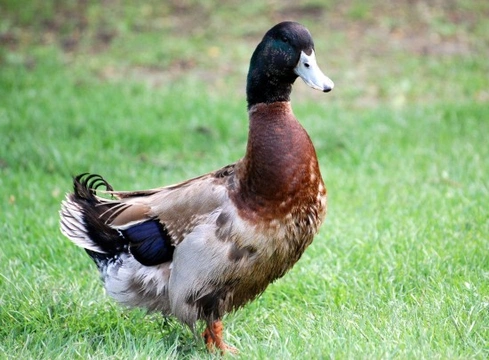
Wet Feather in Ducks & Geese Explained
The great thing about keeping ducks and geese is that it's pretty problem free and both are great fun to have around as long as you have enough space to do so. However, there is one condition called "wet feather" that affects all waterfowl. In general, they boast waterproof feathers which is essential as it protects them from getting water-logged when they are on the water. Once off a pond, geese and ducks will religiously preen their feathers and in doing so they rub a gland known as the "preen gland". It is this gland that produces the much needed oil that provides the waterproofing waterfowl need on their feathers.
Feathers have what are known as barbicelli on each of them and these tiny hooks interlock when a bird preens itself and they are vital to the waterproofing process. Just about everybody has heard the expression "water off a duck's back" and this is exactly what happens when their feathers are waterproofed and their feathers have interlocked.
Both goslings and ducklings can take to the water when they are just a day old because their feathers have been waterproofed by their mothers whilst they were sitting on them. It's important to remember that ducklings or goslings hatched out in an incubator will not have waterproof feathers because they have not come into contact with their mother's feathers. As such if and when they do go on water, they need to be kept warm when they come off because they will be soaking wet and therefore at risk of catching a chill.
Why Wet Feather Occurs
There are a few theories as to why some ducks and geese may get wet feather and there are a few ways to treat the condition. However, some breeders believe there is no cure and as such people should not breed from ducks or geese with the condition with a few people believing the birds really need to be culled.
Another reason why wet feather may occur is due to ecto-parasites that live either in feathers as well as on the skin and which can make a bird over-preen themselves. This results in the crucial interlocking barbicelli being broken down and as such they are unable to oil and waterproof themselves properly. This is why it is so important to routinely treat birds for external parasites.
If ducks or geese are kept in an area without enough water they can swin in and then moved to another area where there is plenty of water, this too can be a reason for them to suffer from wet feather. However, most of the time if this is the the reason for the condition, both ducks and geese will be able to recover within a couple of weeks and would be able to re-oil themselves as long as they are healthy birds that is.
Lastly, if the preen gland is compromised and not producing enough oil, this too can lead to a bird suffering from wet feather. A poor diet can cause this to happen so it is really important for waterfowl to be fed good quality wheat which contains all the essential vitamins B and E which helps promote a healthy production of oil from their preen gland.
Symptoms of Wet Feather to Watch Out For
If you notice a duck or a goose comes off the water and their feathers look soaked through and remain wet and damp for a long time they could be suffering from the condition because waterfowl should typically have glossy sheen to their feathers even when they first come off the water.
More often than not, it is outer feathers that are affected although flight feathers too can become water-logged. This results in birds getting really cold quickly and you may even find affected birds will not want to go on the water at all which only exacerbates the problem.
More often than not it's when a bird's feathers become covered in mud that wet feather takes hold and a lot of people believe the culprit is indeed the mud itself that strips off the oily protection that's needed on their feathers. Birds with the condition find it hard to re-oil themselves which then means they are greater risk of becoming water-logged and getting too cold.
Prevention is Better Than Cure
The best way to reduce the risk of wet feather from occurring is to ensure ducks and geese are kept away from muddy conditions. If you are lucky and a duck or a goose has suffered the condition one year, next year's growth of feathers may be okay but this is not always guaranteed.
Conclusion
It is really important that all waterfowl have access to lots of water so they can swim and bathe at all time. Even if you don't have a pond in a garden, it's important to have a deep dish that your ducks and geese can get on. It is also important for ducks and geese to be fed a correct diet that contains plenty of good quality wheat so their preen glands produce all the oil needed for them to waterproof their feathers on a constant basis.



